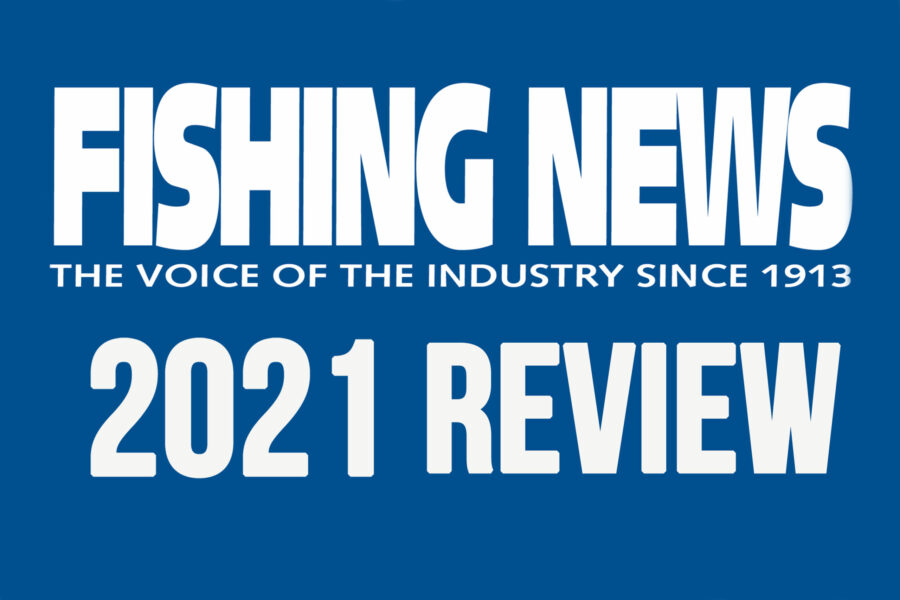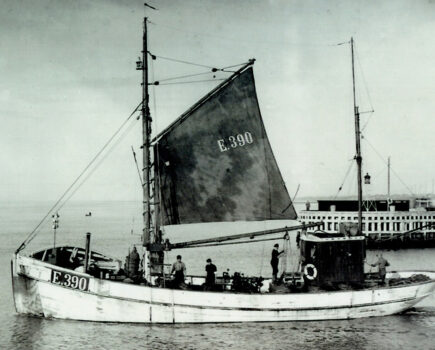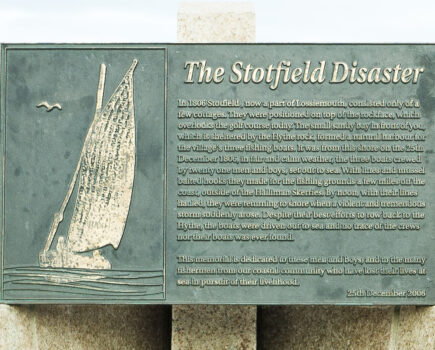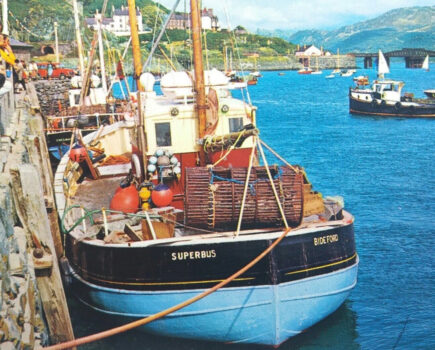Gaby Bartai looks back on a tumultuous 12 months for the UK and Irish industry
If the start of 2021 was heralded as a new dawn outside the EU and CFP, 2021 opened with the growing realisation of the ramifications for the industry – and of how little of what had been promised had actually been delivered.
The immediate losses caused by disruption to EU export markets were reduced as the industry mastered the new paperwork requirements at the border, but compensation came late, and the failure to agree access arrangements with Norway and Faroe came as a hammer blow to some sections of the whitefish sector, and also impacted Scotland’s processing industry.
The TCA, too, continued to create difficulties across the entire year. There was hardly a month without the French industry issuing some new ultimatum over UK or Jersey access. Channel fishermen saw fish stocks dry up in the face of ever-growing effort by EU seiners granted rights to huge catches of fish under the TCA – which undoubtedly contributed to the significant fall in English fishing employment recorded in the annual statistics published this autumn.
Those statistics were also concrete proof of lost and reduced earnings in all but one sector of the UK industry.
On top of this, the number of fatalities across the industry was a stark and sadly all too regular reminder of the dangers inherent in fishing, and the high price that many families, and fishing communities, pay to put fish on consumers’ tables.
Moving into 2022, our industry will not be sad to see the back of a tough year, and will be looking forward to the new year with more realistic expectations. Elements of the TCA will be particularly difficult for many fishermen to live with, but a better outcome to the 2022 international negotiations means we should avoid at least some of the deep wounds inflicted upon the industry in 2021.
January

Seafood lorries from across the UK headed to Westminster to protest at export delays. (Photo: Lee Elliot)
The front cover headline of the first issue of 2021 was ‘Brexit talks go to the wire’ – translated: the trade talks, the deadline for which had been shuffled forward, month by month, then week by week, then day by day, all through the second half of 2020 – had still not wrapped up when we sent the first 2021 issue to the printer.
The new year opened on a dark note, with the UK in the grip of a third Covid lockdown. The year’s first issue also reported on devastating losses of seafood consignments after the French border was closed in the run-up to Christmas due to the worsening Covid situation.
By the following week, we could report that the TCA deal was done, and the headline set the tone for the year: ‘Boris Brexit betrayal’. ‘Industry fury at Brexit sell-out’ headed eight pages of industry reaction to the Christmas Eve deal, which saw only 25% of EU quota in UK waters repatriated, phased in over five and a half years; the ending of PO to PO international quota swaps; and full reciprocal access to waters, including the six to 12-mile zone – supposedly a UK ‘red line’.
‘A once-in-a-lifetime chance for the UK to right historic wrongs has been squandered’ was the FN verdict – with the announcement of a £100m industry support package seen as scant compensation. There was also fury in Ireland that the Irish fleet was set to lose a disproportionate share of the quota to be returned to the UK.
The 21 January issue reported further Brexit fall-out: delays and plunging prices as new export red tape caused delays at the border, causing spoilt consignments and cancelled orders. Many boats, faced with multiple uncertainties – export challenges, new lockdowns and reduced quotas – chose to tie up until the situation improved. Prices for some export species fell by up to 80%.
At the end of January, seafood exporters took their frustrations to Westminster, with 24 lorries from across the country parking up in central London in protest. A £23m support package for affected exporters was announced – but with no funding for vessels affected by the knock-on drop in demand.
A claim by Boris Johnson in Prime Minister’s Questions that ‘El Dorado’ awaited fishermen at the end of the five-and-a-half-year transition period was greeted with derision. As Orkney and Shetland MP Alistair Carmichael pointed out: “El Dorado was a myth that led to many wasted lives searching for treasure that never existed.”
February
February opened with the tragic news that three men had been lost with their vessel off the North Wales coast. A two-day air and sea search for the Nicola Faith and her three crew, skipper Carl McGrath, Alan Minard and Ross Ballantine, was called off with no sign of the vessel or the missing men.
The next week, another death, of Leigh Spencer in an accident onboard the Cornishman off the Isles of Scilly, was announced. A third tragedy was reported the following week, when Edison Joseph Carrera Lacaste died after falling from the Shetland trawler Copious.
The deaths were also announced of Irish industry leader Hugo Boyle and Fleetwood fisherman and inshore leader Steve Welsh.
There was a further blow for export trade: all exports to the EU of live bivalve molluscs were banned with immediate effect – unless from Class A waters, of which England and Wales has few – due to the UK now being a ‘third country’.
The setting up of a Scottish exports taskforce was announced by the UK government, while the Scottish government announced a £7.75m funding package for the industry north of the border.
Another of the year’s big issues emerged with the first reports of concern about the growing number of Dutch fly-shooters working in the Channel.
The disabled Opportunus IV PD 96 and her five crew were rescued from imminent disaster by the Peterhead lifeboat and the six-week-old Fraserburgh trawler Jacqueline Anne when the towline broke just yards off the Peterhead breakwater.
March
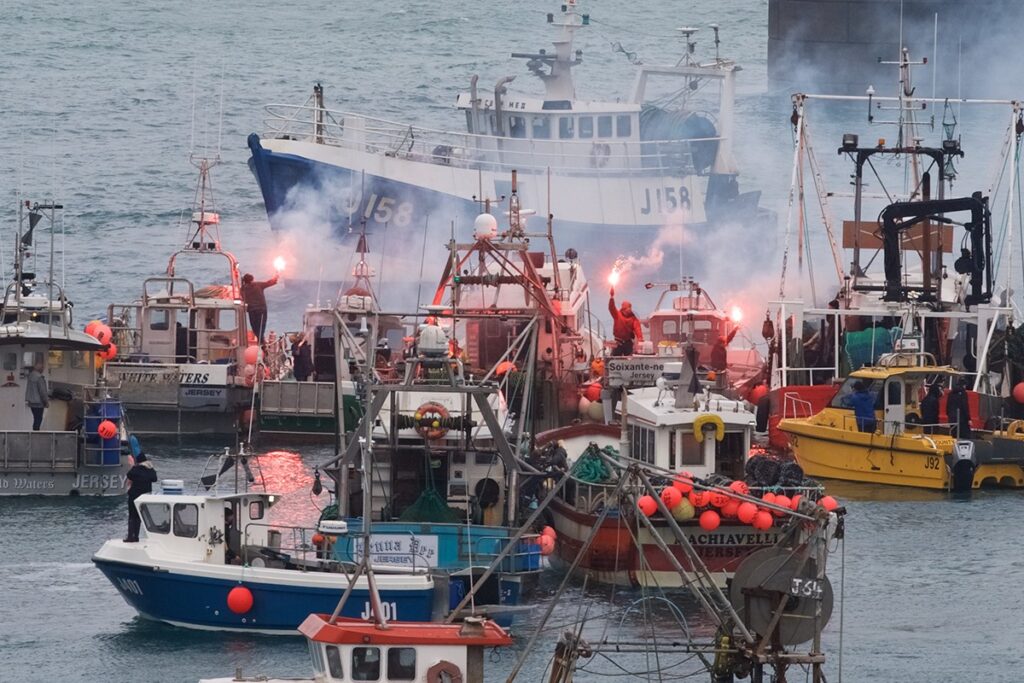
Protests by Jersey fishermen highlighted the dispute with France that would run right through the year. (Photo: David Ferguson)
Provisional MMO data showed a 24% fall in the value of landings by UK vessels in UK ports in 2020. Vessels targeting shellfish and premium whitefish were particularly hard hit, with Nephrops landings down 46% and crabs down 42%.
It was reported that UK fish and shellfish exports had fallen by 83% in January 2021. Following intensive pressure by the industry, the £23m exporters’ compensation scheme was extended to under-40m vessels.
Jersey fishermen blockaded St Helier to draw attention to the problems they were facing as a result of restrictions on them landing to French ports.
A decision by the Home Office to accept a recommendation that deckhands be recognised as skilled workers made it (marginally) easier for vessel owners to employ non-EEA crew.
The Greenpeace vessel Esperanza illegally dumped 15 boulders in the Brighton Offshore MCZ, resulting in a furious response to this ‘vigilante’ action by the NFFO.
The deaths were announced of Cornish industry leader David Muirhead and Northern Ireland leader Roy Shaw.
At the end of the month, the UK agreed its first deal as an independent coastal state: the trilateral UK, Norway and EU agreement on TACs for six jointly managed stocks, delayed from December by the Brexit negotiations. The 10% reduction in the cod TAC, while smaller than that recommended by ICES, was nevertheless greeted with dismay by an industry that was seeing very different numbers of cod on the grounds.
The 2021 Fishing News Awards were launched as a virtual event.
April
The cover of the Easter issue carried a picture of whitefish boats tied up at Peterhead, alongside the report that over the previous six markets, only half the number of boxes had been sold on Peterhead market as on the same six markets in 2019, due to skippers limiting effort to manage reduced quotas.
Provisional quotas set for the first three months of the year were extended into April as TAC negotiations between the UK and EU dragged on, and talks with Faroe concluded with no deal on access or quota exchanges. UK Fisheries, operator of the UK’s only remaining distant-water trawler, urged the government to strike a deal on access with Norway, as the Kirkella was now tied up with nowhere left to fish.
French fishermen made their first threat of action in response to what they claimed was the UK’s failure to honour the Brexit TCA by not issuing sufficient licences to French boats to fish in the 6-12nm zone.
The EU withdrew Ireland’s control plan for weighing catches away from the place of landing, with the result that all pelagic landings now had to be weighed on the quayside.
Seven crew were rescued by helicopter before the Wexford trawler Ellie Adhamh WD 206 sank off the West Cork coast.
Vessel owner John MacAlister (Oban) Ltd was fined a record £187,170 for multiple breaches of local scallop dredging regulations and national fisheries legislation off the Yorkshire coast.
The new Vestvaerftet-built whitefish trawler Courageous LK 470 completed sea trials off Thyborøn before heading home to Shetland, while Parkol Marine Engineering’s latest build, the Newlyn netter Amanda of Ladram PW 6, ran trials off Whitby.
May
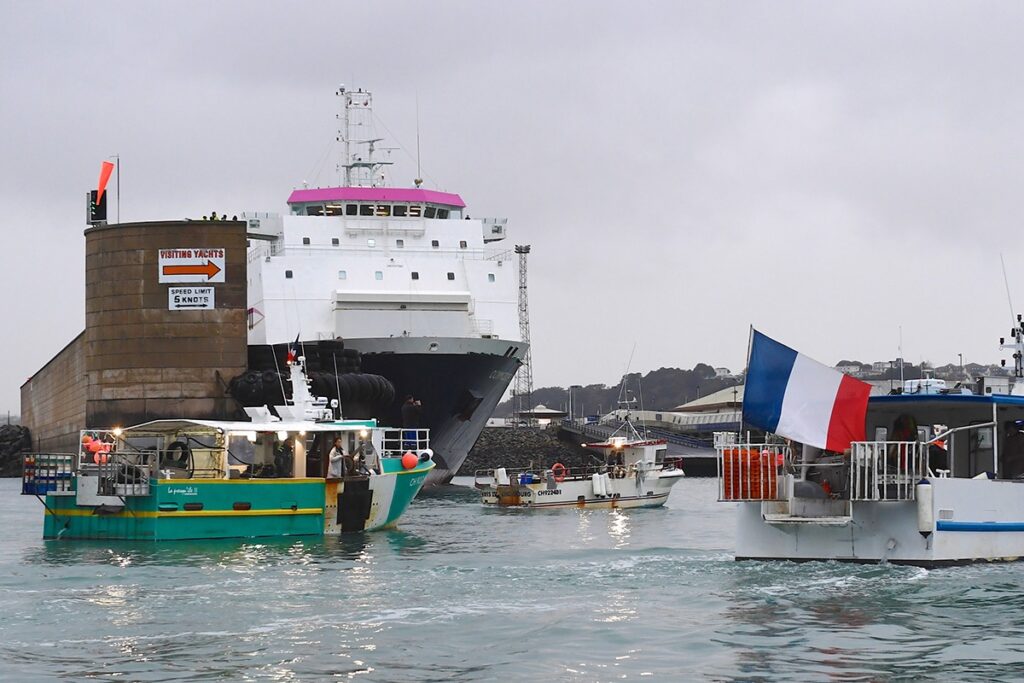
French boats threatened to blockade St Helier, leading to the dispatch of two Royal Navy patrol boats to Jersey. (Photo: David Ferguson)
The month opened with reports of mounting issues for the Scottish whitefish fleet due to the ending of international PO to PO quota swaps. More skippers were being forced to tie up to eke out their available quota, resulting in markedly reduced landings.
The following week, it was announced that talks with Norway had ended with no agreement for 2021 on access and quota transfers, leaving whitefish skippers with even fewer options and UK Fisheries’ trawler Kirkella with virtually no fishing opportunities for the year.
Tensions rose in Jersey as a fleet of 70 to 80 French boats stood off St Helier, threatening a blockade of the port. The UK responded by dispatching two Royal Navy patrol boats. France upped the stakes by threatening to cut off electricity supplies to Jersey if the dispute was not resolved in its favour, while French fishermen obstructed landings by Jersey boats, leaving the entire Jersey fleet tied up for several days.
A Scottish cabinet reshuffle saw Mairi Gougeon replace Fergus Ewing as fisheries minister.
Four crewmen were rescued when the gill-netter Horizon S 329 caught fire and sank off Co Cork.
June
On 10 June, the 2021 UK-EU fisheries deal was finally agreed after a marathon five-month-long negotiation, securing reciprocal access rights, establishing TACs for 75 shared stocks, and setting up an interim quota- swapping mechanism – but deferring decisions on many of the most difficult issues, including catch limits on non-quota stocks, until 2022.
A flotilla of 73 Irish vessels steamed to Cork harbour to highlight the ‘existential’ industry crisis as a result of inequitable ‘burden-sharing’ that saw Ireland lose a disproportionate amount of the quota returned to the UK after Brexit.
There was outrage in the pelagic sector when it was announced that Norway and Faroe had awarded themselves unilateral mackerel quota increases of 55% apiece, threatening the sustainability and future certification of the entire fishery.
With the worst of the exports crisis now easing, the Scottish Seafood Exports Taskforce met for the final time.
It was announced that pilots for Highly Protected Marine Areas in English waters were to go ahead.
There were renewed reports of Scottish and Irish boats being forced off their traditional grounds by ‘wolf packs’ of Spanish and French longliners.
Macduff Shipyards achieved an impressive double when the new Faithful FR 129 ran sea trials on the same day that her identical pair-seine partner Crystal River FR 178 was launched at Buckie.
The virtual Fishing News Awards took place on 17 June, with Lifetime Achievement awards for Peterhead skipper James Stephen and SWFPA chief Jim Portus, and the new U10 Fisherman of the Year award going to Tristan Northway.
July
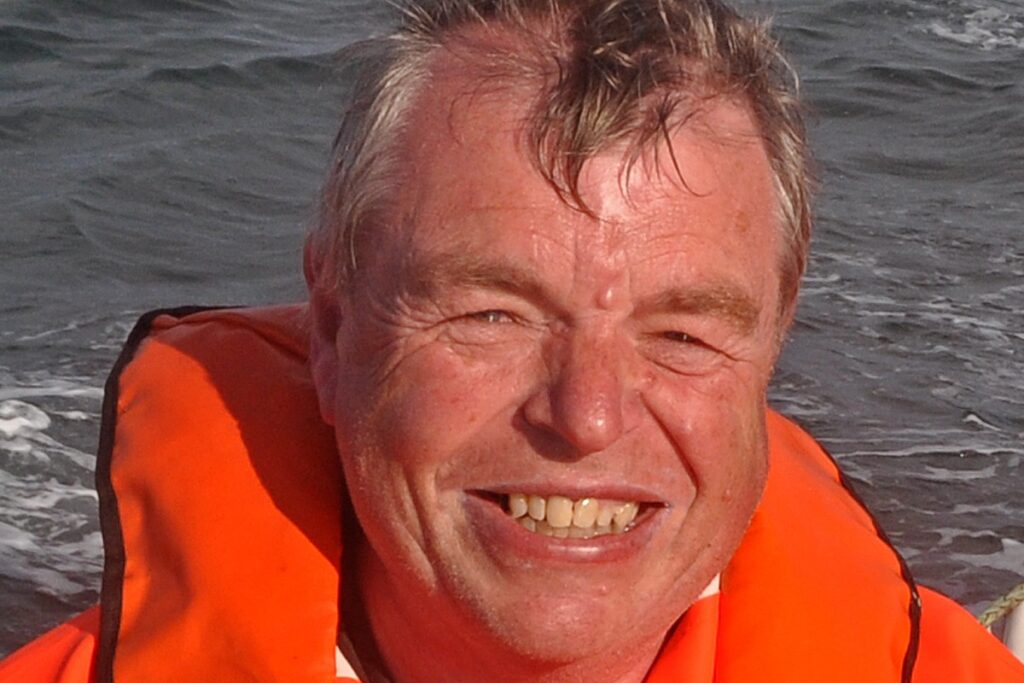
David Linkie 1954-2021.
July opened with the devastating news that Fishing News editor David Linkie had died after an 18-month battle with cancer.
Dave’s legendary commitment to the paper meant that he carried on writing until a couple of weeks before his death – but as his health deteriorated, the support and additional input of the rest of the Fishing News team was invaluable and hugely appreciated, enabling us to continue getting the paper out each week in desperate circumstances. Also greatly appreciated was the assistance of friends and colleagues from the industry, who stepped up to supply photographs and provide information so that Dave could continue producing news stories, and his epic boat features, right up to the end.
The 15 July issue carried Dave’s obituary, alongside tributes from across the industry that could have run to many more pages.
Tragedy also struck the industry in North West Scotland when Mallaig skipper Lachlan Robertson died after jumping from his vessel Reul a’Chuain to rescue a crewman who had fallen overboard.
It was announced that the operating profit of the UK fleet had fallen by almost a fifth in 2020 as the sector dealt with the impacts of the Covid pandemic.
ICES recommended a 10.3% cut in the North Sea cod TAC for 2022. This was described as ‘desperate news’ for an industry already struggling to cope with the 2021 TAC, and leading to renewed calls for a ‘second opinion’ on ICES advice.
Irish fishermen staged a protest against the existential threat to their future posed by the Brexit TCA, steaming up the river Liffey to Dublin.
The twin-rig trawler Westra Fjord K 193, built by Vestvaerftet, arrived home to Orkney, and the supercrabber Frank Henry DH 181 joined the South Devon fleet. Parkol’s latest build Audacious DA 62 was lifted into the Tees, while Mooney Boats delivered the pelagic trawler Ella G 233 to Killybegs owners.
August
It was announced that huge new areas of Scottish seas had been earmarked for offshore wind farm developments. Meanwhile, green groups and inshore organisations renewed their call for a ban on trawling inside three miles in Scottish waters.
Ex-Great Grimsby MP and industry champion Austin Mitchell died aged 86, and fisherman Gary Cornelius was lost after falling overboard from his vessel off Hastings.
Shetland’s new fishmarkets were officially opened by HRH The Prince of Wales, in a ceremony delayed from the previous year due to Covid.
The pelagic trawler Antarctic D 97, built by Karstensens, arrived home to Killybegs. The twin-rig trawler Orion BF 432 was handed over to her new owners, while her near-identical sistership Fruitful Vine emerged from Macduff Shipyards’ fabrication hall. In Poland, the hull of the new twin- rigger Venture IV was launched before being towed to Macduff for fitting out.
September
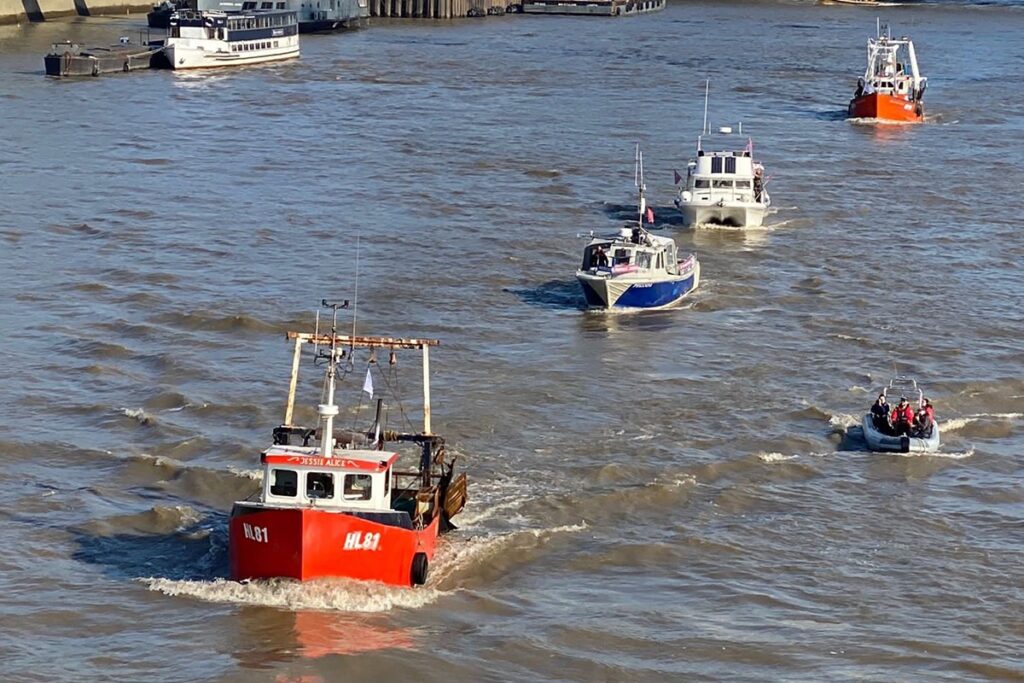
South East fishermen steamed up the Thames to Westminster…
A power-sharing agreement was concluded between the SNP and Scottish Greens following the Scottish parliamentary elections in May, containing extensive commitments on marine environmental protection including the expansion of wind farms, strengthened MPAs, inshore restrictions and mandatory VMS.
South of the border, the MMO announced its timetable for the phasing in of VMS for English under-12m vessels, starting in January 2022. The new MCA code of practice for under-15m vessels came into force, bringing in more stringent inspection and stability requirements for smaller boats.
The first tranche of funding from the promised £100m in industry support after Brexit was announced, with £24m for the ‘science and innovation’ pillar of the funding.
In Ireland, a one-month tie-up scheme for whitefish vessels was announced to help mitigate the impact of quota cuts.
South East fishermen steamed up the Thames to Westminster to highlight the existential threat to their livelihoods from foreign-owned fly-shooters and supertrawlers working in the Channel.
The MMO announced that it intended to prosecute Greenpeace for its boulder dumping action off the Sussex coast in February.
Fisherman John Wilson died after falling from the Harriet J in St Abbs harbour.
Off the Devon coast, crewman Paul Reed from the Plymouth vessel Sidney Rose was thankfully saved by RNLI and Coastguard rescue teams after an hour in the water.
The prawn twin-rigger Ambitious II DA 62 headed home to Ireland following completion by Parkol Marine Engineering, and the new Fraserburgh pair- seiners Crystal River and Faithful completed their joint maiden trip.
For Fishing News, a new chapter began with the appointment of Andy Read as editor.
October
The issuing of further licences for French boats to fish in UK and Jersey waters was greeted with consternation by UK and Jersey fishermen, who accused their governments of caving in to French demands – while failing to please the French, who continued to insist that all outstanding licence applications must be granted. Tensions escalated through the month, with French fishermen warning that they were ready to start blockades.
The annual statistics from the MMO for 2020 revealed that the oft-quoted figure of 12,000 UK fishermen had reduced to 11,298, with most of those losses having occurred in the English fleet. Despite a 14% increase in the value of pelagic landings in 2020, overall earnings for the catching sector decreased by 16%, with the shellfish sector particularly hard hit by pandemic-related disruption.
An NFFO analysis found that the Brexit TCA was set to cost the industry some £300m by 2026 – a figure that was, predictably, rejected by Defra the following week.
The industry reacted in fury to an Asda promotion of Norwegian-caught cod, describing it as a ‘kick in the teeth’ following UK vessels’ loss of access to Norwegian waters for 2021.
The Irish government’s Seafood Task Force made its report, recommending €423m in support for the industry – but also the decommissioning of 60 vessels from the whitefish polyvalent and beam trawl sectors.
Fraserburgh fisherman Joe Masson was lost from his creel boat Goodway.
The Fishing News team suffered another loss with the death of longtime south coast correspondent John Periam, and in the same week, Southend West MP and industry supporter David Amess was murdered.
November
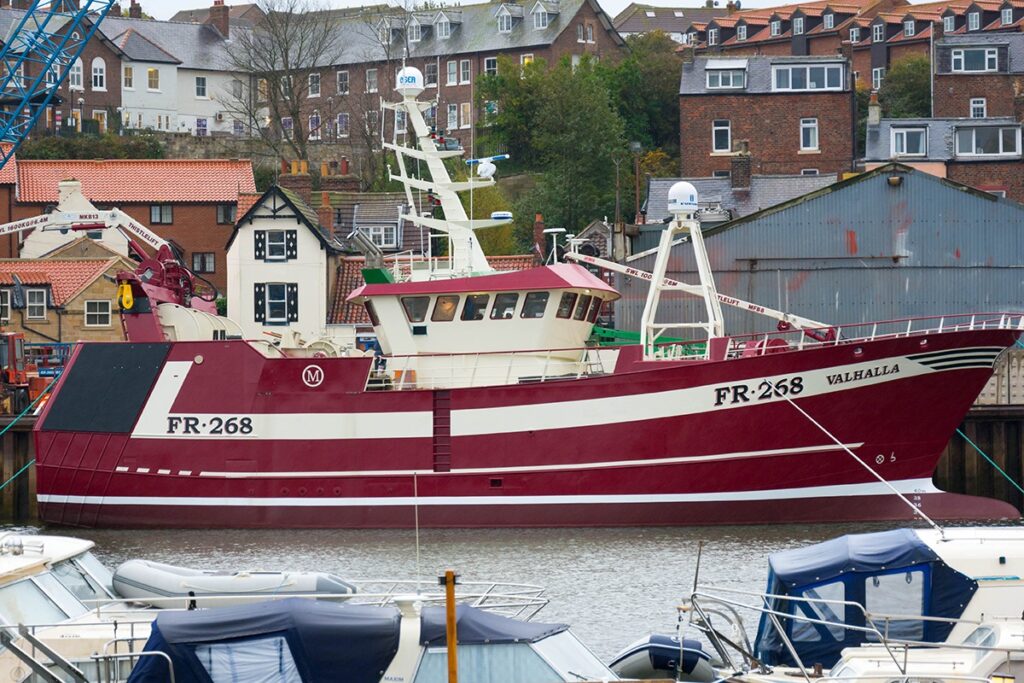
Parkol Marine Engineering celebrated its 50th anniversary – and the imminent completion of its 50th build, the Valhalla FR 268.
The industry reacted angrily to Boris Johnson’s latest piece of policy-making on the hoof, when he suggested to a young audience of ‘Ocean Defenders’ ahead of the COP26 climate conference that he was in favour of phasing out scallop dredging entirely.
The North East Atlantic Fisheries Commission reached interim agreements on Atlanto-Scandian herring, blue whiting and mackerel, but deferred full agreement on those stocks, and a decision on TAC shares for blue whiting, to further discussion in 2022. Scottish leaders warned of the risk of continued overfishing as a result.
The licences dispute escalated, with France threatening to ban all UK landings in designated French ports and introduce tougher health and customs controls, and detaining the UK scalloper Cornelis Gert Jan.
The London inquest into the 2004 loss of the French trawler Bugaled Breizh and her five crew concluded, with the coroner ruling that there had been no submarine involvement, as had long been suspected.
The debate on Scottish inshore management rumbled on, with a call at COP26 for a three-mile trawl ban, and a separate call for a static gear cap.
Billy Stevenson, of the Newlyn family of vessel owners, merchants and auctioneers W Stevenson & Sons, died aged 93.
David Linkie was posthumously awarded the Desmond Wettern Award for Best Journalism at the 2021 Maritime Media Awards.
Parkol Marine Engineering celebrated its 50th anniversary – and the imminent completion of its 50th build, the Valhalla FR 268. The twin-rigger Loch Inchard III, built by C Toms & Son, headed home to Kinlochbervie.
December
French fishermen threatened unilateral action against UK landings and exports in the ongoing licences row. The following week, the EU set a 10 December deadline for agreement, French fishermen mounted a token blockade – and in an indication of the way the wind was blowing, Guernsey granted licences to 40 French vessels, and Jersey to a further nine.
A report from the London School of Economics found that decapod crustaceans and cephalopod molluscs can feel pain, leading to their inclusion in the Animal Welfare (Sentience) Bill currently going through parliament, with far-reaching implications for the capture, storage, transport and sale of live shellfish.
Crunch World Trade Organisation talks, billed as the venue for possible agreement, after discussions going back 20 years, on harmful fisheries subsidies, had to be postponed when travel restrictions were imposed to combat the new Omicron Covid variant.
With news stories in the final week of the year including further threats of French action in the licences dispute and challenging cod TACs for 2022 emerging from the trilateral talks on shared North Sea stocks, against the alarming backdrop of rapidly rising Covid cases, there is little sense of any resolution at the end of this singularly turbulent year.
The wrap-up line on last year’s review of the year was: “The two big stories of 2020, Brexit and Covid, look set to run and run.” The date may have changed, but those sagas go on… and on…

